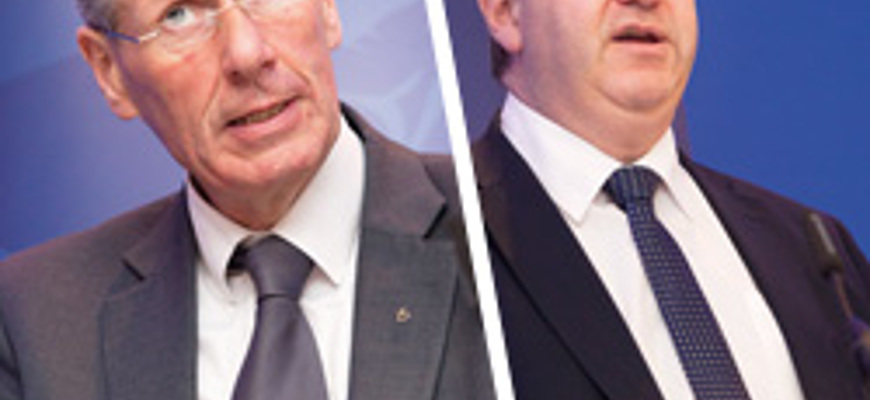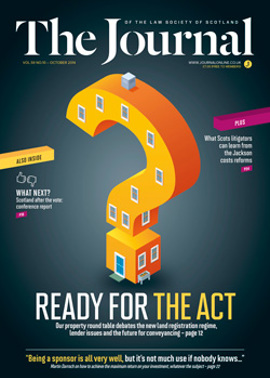The (legal) people have spoken

When did the Law Society of Scotland become such a desirable place for our political leaders to be seen? In the past few years, its conferences have seen a succession of high-profile public figures share the platform, and this year’s Law in Scotland conference, “The people’s verdict, so what now?”, must have trumped the lot.
Even after the First Minister called off (Justice Secretary Kenny MacAskill took his place), we had present or past leaders of the three other main Scottish parties, along with Scottish Secretary Alistair Carmichael, two MEPs including UKIP’s David Coburn (good value at least for getting an audience reaction), and a scattering of politically prominent lawyers along with gurus from business, academia and media.
Deliberate or not, the timing was spot on. Two weeks after the independence referendum, in a still-febrile atmosphere with parties jockeying for advantage as the Smith Commission began its task, there was obvious media interest in the event, chaired like the April referendum seminar by the BBC’s Sarah Smith.
Commendably, all the politicians, including keynote speakers MacAskill and Carmichael, gave ample opportunity for questions from the floor, which provided much of the meat of their sessions. The Justice Secretary took his stand on Scotland wanting the powers to tackle social justice and inequality; if Lord Smith’s Devolution Commission had to work to a demanding schedule, that was what the other parties had promised and they had to deliver. The Scottish Secretary emphasised his and his party’s commitment to human rights as part of the devolution settlement (in the face of the Conservative proposals published that morning), and the significance of cross-party agreement for the durability of any settlement.
The panel on the European Union, on which we may see our next referendum, ranged from the SNP’s Tasmina Ahmed-Sheikh claiming that Scotland backed the EU and supporting its social agenda, through pro-EU Tory MEP Ian Duncan backing David Cameron’s negotiations as likely to deliver a stronger organisation (the UK is far from being the country on the fringe, he assured us), former civil servant John Edward questioning how the various interests would line up in any referendum, to UKIP’s Coburn who denounced the “socialist bureaucracy” of the EU, many of whose officials had “screwed up their own countries first, then gone on to Brussels”.
Addressing the impact of the referendum outcome on business, the Scottish party leaders (along with the SNP’s Jim Eadie) in essence believed that the economy, particularly as affecting bank willingness to lend, would have more continuing impact than the politics would, and pointed variously to the extent of powers already devolved as well as to the potential for more flexibility in fiscal management.
Back to the economy
Far from being just a political love-in, however, this was a conference equally dedicated to law practice management – it also happened to coincide with the breaking news of Tods Murray’s administration – and to the in-house sector, as the event embraced for the first time the ILG’s own annual conference. We hope to report more fully on the ILG streams next month.
While we couldn’t cover every streamed session, writer/commentator Jill King (ex-HR director at Linklaters) gave a well-pitched presentation on “Lessons from the recession”. Not the only speaker to have a message relevant to in-house as well as private practice solicitors, King asked who felt they had had “a good recession” – recalling Churchill’s dictum, “Never let a good crisis go to waste.”
She had in mind a process of learning and becoming stronger, rather than purely financial measures. “The best firms didn’t sit back; they reached out to clients”, she said: relationships that are not so good will be exposed in bad times. Good firms found innovative ways of sharing risk, and funding fees; they offered pro bono secondments and “date nights” to build relations, and help make clients more resistant to competitor advances.
They also developed more internal flexibility, in terms of career structures (“career lattice rather than career ladder”) and tackling the “silo mentality” through, for example, cross-practice training programmes, requiring every associate to have a second string to their bow, and co-locating practice teams – one of the most difficult things to achieve, she observed, but very successful where it was.
Above all it required “honest transparent leadership”, something as challenging for a practice manager as for any politician (there was no getting away from them that day). Honest communication, sincerity, dialogue and openness, encouraging strong teamwork as an organisational matter and ensuring people felt supported at a personal level, all helped build the necessary trust.
And you need someone to talk to. “Nobody should be struggling on alone or thinking that they have to come up with all the answers”, she counselled – managing partners need advisers and mentors as much as sole practitioners do.
The difficult art of simplicity
The majority who did not stay for the Saturday morning session missed two first-rate speakers.
Can lawyers “keep it simple”? Someone must think so, or they wouldn’t have invited Ken Segall, former creative director at Apple, to open the session with “Simplicity – the most powerful force in business”.
A man with a self-deprecating sense of humour, Segall, who came up with the “i” prefix for Apple products (“I’m a writer and I’ve written longer things than that”), also gave some real insights into how names and concepts emerged at the company, and to working alongside the unpredictable Steve Jobs.
What might lawyers take from it? Perhaps they could start with the twin principles “Minimise the words”, and “Humanise the words”. For example, launching the iPod, Apple didn’t focus on processing power, or bytes of memory, but the idea of “A thousand songs in your pocket”. Or, to quote Leonardo da Vinci, “One should use common words to explain uncommon things.”
Then there was their focus on customer loyalty. Jobs was “very anti-advertising in the way he advertised”, Segall told us. He wanted to make names simpler in order to make customers “love Apple more”. If they did, they would keep buying; they would evangelise their friends and colleagues; and they would stick with Apple in bad times.
Simplicity, he admitted, takes hard work to achieve, but it has the power to get you to “like or love a company that you may not have any affinity for”. Two examples were the postal service, in the USA as in the UK, introducing stamps that say “First” or “Second”, rather than a money amount that leaves you short each time the rates change; and a McDonald’s promotion that offered any size coffee for $1.
Or how about this for a message: “Our goal is not to make money but to make great products. If we do, we trust that in consequence, we will make money. But if we do what we do well, the money will take care of itself.”
Even more difficult?
One key feature of the strategy that turned Apple round from near-bankruptcy (in 1997) to the world’s most valuable company (in 2011) was its concentration on “doing fewer things better”. That chimed neatly with the following presentation, from lawyer turned legal profession strategist Professor Stephen Mayson. Under the theme of avoiding difficult decisions, and the consequences – addressed equally to in-house teams as to private practice – Mayson identified 25 common management issues that lawyers regularly duck, one of the first being what are you selling, to whom, and where?
Putting it another way, what are you going to say no to? This doesn’t just mean practice areas: Mayson also counselled against picking up “sprat work” from desired clients in the hope at some point of landing their “mackerel”. “If you take that work, it’s likely that’s all the client will give you”, he advised.
Many of Mayson’s “difficult decisions” will have a familiar ring to readers of advice columns in this Journal and elsewhere: pricing for value rather than cost; holding people (especially partners) accountable for performance, and facing up to the “big beasts” in your practice; appointing the best people to management positions irrespective of status; dealing with overcapacity; not letting clients away with late payment; aligning decisions with a firm’s values and ethics. Here are a few other points that are perhaps heard less often:
- Your competitive advantage is whatever makes you different, and every firm has two unique features to start with: its employees, and its clients. Whatever makes them different, promote it.
- Many lawyers believe that borrowing is bad – but for most businesses it is a normal part of investment decision-making. How else will you compete with larger non-lawyer businesses looking for a share of the market?
- Linking contribution to rewards does not mean “eat what you kill”; it also works with equality-based profit systems, if you define what individuals should do to justify taking out their share.
- Admissions to the partnership must be “gold standard” – avoid marginal cases, as any problems are much harder to deal with once the individual is in the partnership.
- Discount a prospective lateral hire’s client following by two thirds. On Mayson’s research, one third will stay with the previous firm, and one third go somewhere else altogether.
- A professional approach and a business approach are not mutually exclusive, he concluded, but they are two different mindsets. Provided the profession adopts the right approaches, it potentially has a great future.
In this issue
- Respect revived
- Adoption: when should contact continue?
- Family values
- Designs on IP law
- Section 29 claims, time bar and service
- Sharing the rewards
- Reading for pleasure
- Opinion: Lauren Wood
- Book reviews
- Profile
- President's column
- Making the big changeover
- People on the move
- Another leap forward
- LBTT: aligning payment and registration
- The (legal) people have spoken
- Powers of attorney: another angle
- Greatness begins with a pin badge
- Jackson: has it delivered?
- The test for causing alarm
- When do licensed premises "cease to be used"?
- Empowering communities
- Has clawback lost its tax bite?
- Scottish Solicitors Discipline Tribunal
- Property Law Committee Update
- Call it a comeback
- Refereeing the referendum
- Law reform roundup
- From the Brussels office
- What's next for SYLA?
- Mediation first
- When life begins at 60
- With growth there is risk? (2)
- Ask Ash
- Sustainable future: new ideas for the training contract
- Mentoring - why?
- Lender Exchange: what's it about?
- A bar removed






